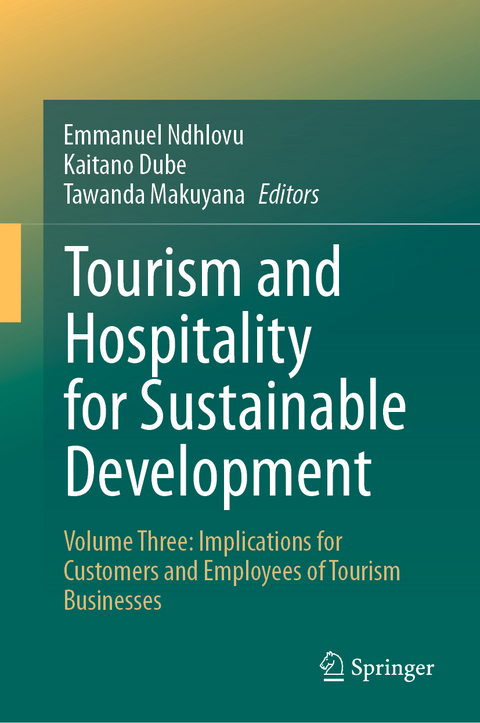
Tourism and Hospitality for Sustainable Development
Springer International Publishing (Verlag)
978-3-031-63076-7 (ISBN)
With the drive towards disability inclusion, digitalisation, technological innovations, and inventions can play a significant role in universal design and reasonable accommodation for the aged and population with disabilities in Global North and South. Such forms one of the key pillars of accessible tourism and hospitality. In the context of the above and in response to the thoughtful need for new and sustained study of the developments, interrelationships, potentialities of the topic, and synergies, this edited book explores the trends, opportunities, challenges, and complexities of digitalisation and technology integration in the tourism and hospitality industry, as well as strategic shifts that will contribute to emerging research streams. The book comprises contributions that generate theoretical insights, empirical findings, and evidence-based recommendations by focusing on emerging and forecasted technologies that are used in the tourism and hospitality industry, such as blockchain, robots, Artificial Intelligence, Virtual Reality, big data, and analytics, among others. The aim is to provide a better understanding of how disruptive technologies and digitalisation are being currently utilised and how they currently and potentially influence the various stakeholder groups, as well as their future possibilities and impossibilities. This third volume in a three-volume set primarily covers how these new technologies are impacting both consumers and employees of services related to tourism.
Emmanuel Ndhlovu is a scholar and student of development. His research interests are in peasant and informal sector livelihoods, land reform issues, political economy, digitalisation of industries, and food sovereignty. He holds a PhD in Development Studies from the University of South Africa. At the time of writing, Emmanuel was with the Vaal University of Technology as a postdoc researcher.
Kaitano Dube is an Associate Professor seconded to the Ecotourism Management Department. He hosts Postdoctoral Fellows and is acting as a Faculty of Human Science Research, Innovation and Commercialisation Professor. He serves as a senate member and several senate subcommittees such as the Higher Degrees Committee, Senate Research and Innovation Committee Member and Faculty Research and Innovation Chairman, among others. His role is to promote research, innovation, and commercialisation in the faculty.
Tawanda Makuyana is currently attached to the Vaal University of Technology, South Africa, as a researcher in the Tourism Research in Economic Environments and Society (TREES). He is an accomplished researcher in the following areas: Human Capital Development/Human Resources issues, vulnerable groups & Disability issues (Advocacy for socio-economic empowerment of disabled people), Inclusive Workplace and wellness, Inclusive Organisational Policy and Strategy development and implementation, Accessible/inclusive Destination competitiveness, Inclusive- Community Based-Tourism, Nature (biodiversity) based Tourism, Inclusive Sport Tourism & Accessible Tourism. Mixed-method research design is preferred.
Chapter 1: Tourism and Hospitality for Sustainable Development in the Digital Era: An Assessment of the Impacts on Customers and Employees in Tourism Enterprises
Chapter 2: Artificial Intelligence and Robotic Adoption by Customers in the Global Hotel Sector
Chapter 3: Digital Twin and Tourism: Recreating and Reimagining Tourist Experience by Interconnecting Physical and Virtual Systems
Chapter 4: Technology-enhanced tourist experiences
Chapter 5: Customers' attitudes towards the functional use of service robots in a hotel environment
Chapter 6: Application of machine learning in the prediction of employee satisfaction with support provided in a National Park
Chapter 7: Implications of Digital Technologies for the Global Hospitality and Tourism Labour Market
Chapter 8: Automation and Human Resources Management in the Tourism and Hospitality Industry of Zimbabwe
Chapter 9: Human resources aspects in tourism and its technology application: Kenyan perspective
Chapter 10: The effects of digital-internet technology on restaurant service experience among the ageing in Southern Africa
Chapter 11: Accessibility and Inclusion of People with Disabilities in the Tourism and Hospitality Industry within the Fourth Industrial Revolution: A Review
Chapter 12: Implications of Digitalisation on leveraging capabilities of disabled human capital in the sub-Saharan Tourism and hospitality industry
Chapter 13: Implications of Digitalisation on Value Co-creation in restaurant service encounters among disabled people in Sub-Saharan Africa
Chapter 14: Using Technology to attract Tourists and enhance Customer Satisfaction
Chapter 15: Towards Inclusive and Accessible Tourism: The Diagnostic Potential of Digital Tools
Chapter 16: Conclusion- Sustainable Development and accessibility of tourism business to customers and employees.
| Erscheinungsdatum | 14.09.2024 |
|---|---|
| Verlagsort | Cham |
| Sprache | englisch |
| Maße | 155 x 235 mm |
| Themenwelt | Naturwissenschaften ► Geowissenschaften ► Geografie / Kartografie |
| Technik | |
| Wirtschaft | |
| Schlagworte | Digitalization • Employee Satisfaction • Tourism accessibility • Tourism and Hospitality • Tourism inclusion • value co-creation |
| ISBN-10 | 3-031-63076-9 / 3031630769 |
| ISBN-13 | 978-3-031-63076-7 / 9783031630767 |
| Zustand | Neuware |
| Informationen gemäß Produktsicherheitsverordnung (GPSR) | |
| Haben Sie eine Frage zum Produkt? |
aus dem Bereich


